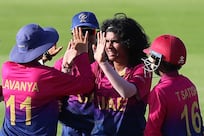The story of the 7-year-old girl who was allegedly the victim of a heartless sexual assault two weeks ago at a private school in Abu Dhabi shocked many, if the grief and anger expressed on social media in recent days is any indication.
According to published reports, the incident was uncovered only after the little girl came back home from school with physical signs of sexual abuse and her aunt asked her about it. The child described what happened: a male employee had touched her while she was alone in the school's kitchen.
The accused, a 56-year-old, reportedly confessed during police investigations to sexually molesting the child more than once on school grounds. In addition to police investigations, the Abu Dhabi Education Council conducted its own investigation to look into this reported attack, and met with pupils' families to guarantee that necessary measures were being taken to protect their children.
Of course, this case must be fully investigated before we draw too many conclusions. Nonetheless, it's never too early to take steps to protect children from possible threats.
Hearing this story, anyone would wonder why a child in grade two was left alone on a school campus without supervision. Where were the school officials when these alleged incidents were taking place? How could the family or the child's teachers have had no idea about the repeated sexual abuse until physical proof was discovered?
A similar incident was reported last week, when police in Al Ain arrested a guard at a private school; the guard was accused of molesting a 6-year-old boy in front of his 8-year-old brother. Luckily, the older brother told his parents, who reported the incident to the police.
Parents expect their children to be safe in school, free to learn and mingle with friends without worry. But without close supervision - teachers watching staff, and other checks - the risk of such horrors as sexual abuse remains.
The first nationwide study on child abuse, completed this year by the Dubai Foundation for Women and Children, found that sexual abuse occurs more frequently in schools than many would care to admit.
The researchers questioned nearly 3,000 Emirati pupils in government schools aged between 10 and 18. Three per cent of them said they had been "touched in sensitive places" in school, with 0.7 per cent saying this happened frequently. Four per cent said they had been "kissed or hugged" in schools, and 1.7 per cent said that that had happened frequently.
These are not massive numbers, but even one assault is too many.
Studies have proven that academic performance and school attendance are often linked to abuse. And of course, the psychological trauma in such cases is significant. That is why this is an important issue that requires our full, immediate attention.
Important steps have already been taken. The Abu Dhabi Education Council (Adec) has issued new regulations for private schools to ensure child safety. The rules place the burden of responsibility on private school administrations for the moral and physical protection of all pupils. This will hold school administrations accountable for any harm done to students.
School officials should always put children under continuous supervision to prevent such cases from happening and report any suspected cases.
Adec's rules will inform nationwide laws to combat child abuse in schools and elsewhere. The federal draft law for child protection, named after Wadeema, the 8-year-old who was tortured to death by her father and his girlfriend, and which is now under discussion by the FNC, will require educators and school officials to report any abuse.
However, after its final approval by the President, Wadeema's Law must be followed up with detailed mechanisms and regulatory frameworks that spell out clearly the process of investigating and reporting suspected cases.
School officials, like other professionals who deal with children, should be required to acknowledge their duty of care towards children. Health service providers - at schools and outside - should be more vigilant and take a more active part in reporting suspected cases. Police should have trained social workers to detect cases and deal with them.
Of course, the first line of defence is the family. Maj Gen Nasser Lakhrebani Al Nuaimi, chairman of the committee for child protection at the Ministry of the Interior, says that "family is the first line of protection [against] the various risks that children may face". Parents, therefore, must always follow up with their kids, ask about their day at school, and communicate with them regularly.
In the two recent cases, the alleged perpetrators will have their day in court. Perhaps, if there is any cause for legal actions against the schools, they will be taken.
But even before these cases are heard, we must all share the responsibility to keep our children safe.
[ AAlmazrouei@thenational.ae ]
On Twitter: @AyeshaAlMazroui




